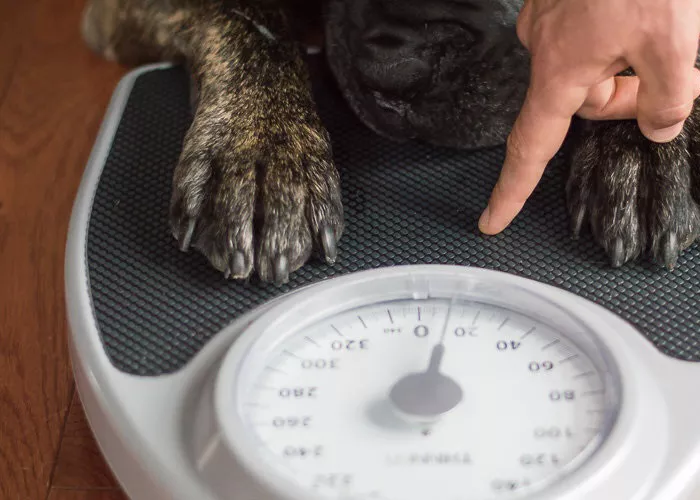Determining the right calorie intake for your large dog is crucial for their overall health and well-being. In this essay, I will explore the various factors that influence calorie needs, provide a general guideline for calorie intake, and offer practical tips for monitoring your dog’s weight and adjusting their diet accordingly.
Factors Influencing Calorie Needs
Age
Puppies and older dogs have different caloric needs compared to adult dogs. Puppies require more calories to support their rapid growth and development. Conversely, older dogs may need fewer calories due to their slower metabolism and decreased activity level.
Puppie: Puppies should eat more calories per pound of body weight than adult dogs. The exact amount depends on their breed, size, and age. Generally, puppies need about 2.5 times the energy of an adult dog of the same breed and size. For example, a large breed puppy may require up to 2,200 calories per day during their growth phase.
Adult Dogs: Adult dogs have more stable caloric needs. The amount of calories they require depends on their activity level and overall health. A moderately active adult large breed dog may need between 1,500 and 2,000 calories per day.
Older Dogs: Older dogs may require fewer calories due to their slower metabolism and decreased activity level. As dogs age, their energy requirements decline, and they may become less active. It’s important to monitor their weight and adjust their calorie intake accordingly to prevent obesity.
Size and Breed
The size and breed of your dog also affect their caloric needs. Larger breeds generally require more calories than smaller breeds to maintain their body weight and energy levels. However, some small breeds, such as terriers and toy breeds, may have higher energy needs due to their active nature.
Large Breeds :Large breed dogs, such as German Shepherds, Golden Retrievers, and Labrador Retrievers, have higher caloric needs compared to smaller breeds. They require more calories to maintain their large bodies and active lifestyles.
Medium Breeds: Medium breed dogs, such as Beagles, Bulldogs, and French Bulldogs, have moderate caloric needs. They may require between 1,200 and 2,000 calories per day, depending on their activity level and overall health.
Small Breeds: Small breed dogs, such as Chihuahuas, Yorkies, and Miniature Dachshunds, generally have lower caloric needs. However, some small breeds, such as terriers and toy breeds, may have higher energy needs and require more calories to maintain their active lifestyles.
Health Status
Your dog’s health status can also affect their caloric needs. Dogs with certain health conditions, such as diabetes, hyperthyroidism, or Cushing’s disease, may require special diets and calorie adjustments to manage their symptoms.
Diabetes: Dogs with diabetes may require a balanced diet with controlled carbohydrate intake to manage their blood sugar levels. They may also need fewer calories to prevent weight gain and improve insulin sensitivity.
Hyperthyroidism: Dogs with hyperthyroidism have an overactive thyroid gland, which can increase their metabolism and calorie needs. They may require more calories to maintain their weight and energy levels.
Cushing’s Disease: Dogs with Cushing’s disease have an excess of cortisol, a hormone that can increase their appetite and calorie intake. They may require a calorie-restricted diet to prevent weight gain and manage their symptoms.
Monitoring Your Dog’s Weight and Adjusting Their Diet
Once you’ve determined your dog’s daily calorie needs, it’s important to monitor their weight and adjust their diet as needed. Here are some practical tips for managing your dog’s weight and calorie intake:
Weigh Your Dog Regularly
Weigh your dog regularly to monitor their weight and ensure they are maintaining a healthy body condition. Aim for a weight check at least once a month, or more frequently if your dog is prone to weight fluctuations.
Use a Measuring Cup
Use a measuring cup to accurately portion out your dog’s food. This will help you ensure that you are feeding them the correct amount of calories each day.
Read Food Labels
Read the labels on your dog’s food to determine the calorie content per serving. This information is usually listed on the back of the package and can help you calculate your dog’s daily calorie intake.
Adjust Portion Sizes
If your dog is gaining weight, reduce their portion sizes slightly. Conversely, if they are losing weight, increase their portion sizes accordingly. It’s important to make gradual adjustments to avoid causing digestive upset or weight fluctuations.
Choose High-Quality Foods
Choose high-quality foods that are formulated for your dog’s age, size, and activity level. These foods are typically more nutrient-dense and provide better value for your money than lower-quality options.
Avoid Table Scraps
Avoid feeding your dog table scraps, which can be high in calories and unhealthy fats. Instead, offer healthy treats, such as fruits, vegetables, or dog-safe snacks, to reward good behavior.
Monitor Your Dog’s Activity Level
Monitor your dog’s activity level and adjust their calorie intake accordingly. If they are becoming more sedentary, reduce their calorie intake to prevent weight gain. Conversely, if they are becoming more active, increase their calorie intake to meet their energy needs.
Conclusion
Determining the appropriate calorie intake for a large dog is essential for their health and well-being. By understanding the factors that affect calorie requirements, using formulas or consulting a veterinarian, monitoring weight, and choosing the right types of food, dog owners can ensure that their large dogs receive the proper nutrition. Remember to feed your large dog a balanced diet, provide regular exercise, and monitor their health closely. With proper care and attention, your large dog can live a long, healthy life.
Related Topics:


